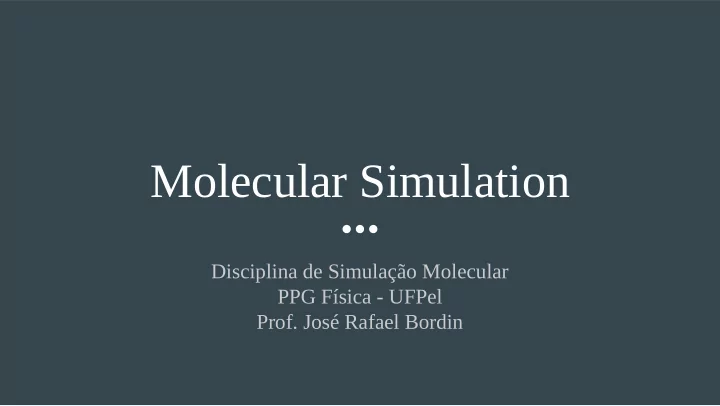

Molecular Simulation Disciplina de Simulação Molecular PPG Física - UFPel Prof. José Rafael Bordin
What is? → Important tool by many researchers in a variety of science fields to understand molecular basic theories. Experiment → We carry out computer simulations in the hope of understanding the properties of assemblies of molecules in terms of their structure and the microscopic interactions between them. → Molecular simulations have served to obtain values of various physical quantities (often inaccessible experimentally) to verify molecular-based theories and to gain insight Simulation Theory into the molecular principles underlying various processes.
→ Except for simple cases , there are no analytical What is? solutions for most of the problems in Stat. Mech. → In most cases, experiments are: Experiment Difficult or impossible to perform; ● Too dangerous to; ● Expensive and time consuming; ● Blind and too many parameters to control ● → Simulation is a powerful tool In some cases can replace experiments; ● Can provoke experiments; ● Explain and understand experiments; ● Simulation Theory Complete theories. ●
Types of MS → Molecular simulation methods can basically be separated into quantum mechanics (QM) methods, which treat electrons as the fundamental interactive particles of the system, and classical mechanics (CM) methods, which treat individual atoms or groups of atoms as the fundamental interactive particles of the system
Types of MS → Molecular simulation methods can basically be separated into quantum mechanics (QM) methods, which treat electrons as the Statistical Mechanics requires statistics fundamental interactive particles of the system, and classical mechanics (CM) methods, which treat individual atoms or groups of atoms as the fundamental interactive particles of the system
Our objects of study MONTE CARLO METHODS STOCHASTIC = RANDOM MOLECULAR DYNAMICS METHODS DETERMINISTIC/TIME EVOLUTION
Our objects of study MONTE CARLO METHODS MOLECULAR DYNAMICS METHODS
Pedagogical Methodology → On-line meeting every 14 days: https://webconf.ufpel.edu.br/b/jos-6qt-jpe → Material available in the e-aula UFPEL/Cobalto and in the website https://wp.ufpel.edu.br/bordin/molecular-simulation/ → Lists to be submited using the Cobalto System – excepted special students → Mandatory: minimal knowledge of some computer language (Fortran, C, Python, etc)
Bibliography 1) Computer Simulation of Liquids, M.P. Allen and D.J. Tildesley https://datagrid.hu/boda/Boda-sajat/Rush/Books/Allen-Tildesley.pdf 2) Understanding Molecular Simulation: From Algorithms to Applications. Daan Frenkel and Berend Smit https://datagrid.hu/boda/Boda-sajat/Rush/Books/Frenkel.pdf 3) Computational Soft Matter: From Synthetic Polymers to Proteins - Lecture Notes. Edited by Norbert Attig, Kurt Binder, Helmut Grubmüller, Kurt Kremer http://juser.fz-juelich.de/record/35298/files/nic-series-23.pdf
Recommend
More recommend